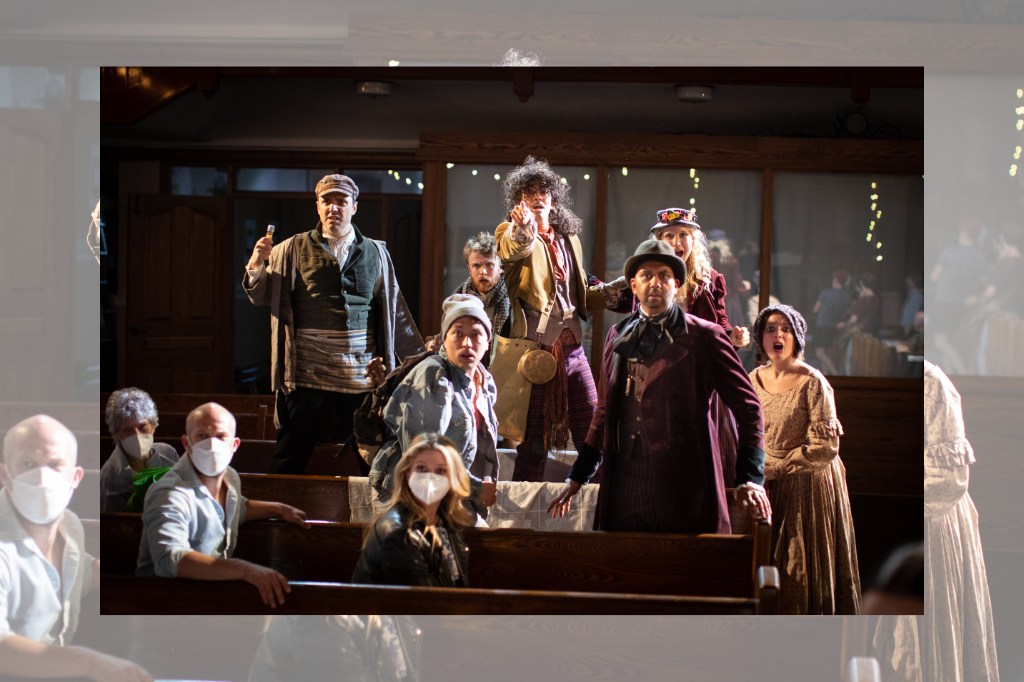REVIEW: Sweeney Todd at Talk Is Free Theatre
I’ve started this review of Talk Is Free Theatre’s immersive, roving production of Sweeney Todd dozens of times.
But where does one start when a project of such ambition shatters any and all expectations?
The Neighbourhood Food Hub on Gerrard Street East is an unassuming place, a church/food bank hybrid which serves as the site of this production. From the first chord in the echoing sanctuary until the final button of Stephen Sondheim’s luscious, intricate score, there are no slow moments, no wasted lyrics: director Mitchell Cushman’s made meaty, musical magic in Toronto’s east end, in a production which leads audiences from room to room (or, er, bakery to barber shop).
Sweeney’s story is an old one, a nineteenth-century melodrama: murderous barber meets opportunistic baker. Pies ensue. The musical’s famous enough to be Office fodder, and I’ve seen six productions of it since 2016 alone (including, yes, another immersive one, with Carolee Carmello as Mrs. Lovett off-Broadway in 2017). Mr. Todd and I go way back (as the daughter of a middle-aged mezzo, I’ve heard many a “Little Priest” in my day) — and I’ve been looking forward to Talk Is Free’s immersive production for months.
Cushman’s invigorated this Sweeney with intrigue and grit — he’s deviated from directorial choices made famous in productions headed by the LuPones and Carious of the world. Here, Mrs. Lovett’s romantic advances towards Sweeney are fully unrequited: never does Sweeney succumb to her advances. Anthony and Johanna’s relationship, too, typically the lighter fare in a musical rubbed raw with grime, has been made much more complicated. After a year in an asylum, this Johanna has seemingly lost touch with reality — it’s a detail which makes sense, given how long she’s been imprisoned, but it’s a choice most productions don’t make, opting instead to rush her into the arms of her (male) saviours. Cushman isn’t afraid to show the worst and the ugliest sides of Sondheim’s characters: in this Sweeney, villains aren’t born, but forged by their abusers and circumstances.
A final nod for Cushman before moving into individual performances: the Judge’s brooding “Johanna” in this production is one of the best moments in musical theatre I’ve seen. In Toronto, in Canada, anywhere. The constant snapping of leather belts in the church sanctuary as audiences enter a small, glass-windowed room with the Judge is horrifying and seductive. As the Judge sings, we see and hear those whipped belts just behind him — it really is a genius touch. That reprise of “Johanna” has often felt to me like a cuttable moment — lugubrious, endless — but here it’s the focal point of the first act, if not the entire production.
Cyrus Lane as Judge Turpin commands the dreary role, a villain in spades. Never before have I seen a Sweeney where I wished for more moments with the Judge — but Lane has found humour in a joyless role. He dives deeply into Turpin’s treachery, reveling in its roots of disgust and self-hatred. A moment of fluid on fingers is difficult to watch but impossible to ignore. His “Johanna” is well sung and truly awful to witness as he beats and then chokes himself with a belt — it’s a performance I wish Sondheim could have seen for its unapologetic lean into the slime of the role. Andrew Prashad’s Beadle, too, is well sung and quietly funny, the perfect sidekick to Lane’s malevolent Judge.
There are no weak links in this cast. Every role is gorgeously sung — no small feat in a score which demands extreme range and musical dexterity.
Michael Torontow is an excellent Sweeney, peeling back layers of the character carefully, methodically; inner turmoils aren’t telegraphed, but whispered, and to great success. Glynis Ranney as Mrs. Lovett plays the humour in the role for all it’s worth: her rendition of “By the Sea” is a riot. Torontow and Ranney’s chemistry is palpable, and Mrs. Lovett’s unrequited love is keenly felt in the small quarters in which it becomes apparent, a tiny parlour attached to the sanctuary.
Gabi Epstein is a standout Beggar Woman, resonant and daring in her vocals and acting choices. Tess Benger’s Johanna is a frenetic one, sweet only in moments of duress, fascinatingly complex. Griffin Hewitt is a formidable Anthony — his pleas to Johanna for her attention are ardent and tender — and Noah Beemer’s Toby is sympathetic and brave. Rounding out the cast are a funny Jeff Lillico as Pirelli, Sweeney’s first sartorial adversary; and a fantastic, compelling Joel Cumber as the sole member of Sondheim’s prescribed Ensemble.
No production of Sweeney would be complete without a kickass band, and there certainly is one here (made all the more impressive by the constant vamping needed for transitional moments as audiences move between rooms). Pianos set up in each room allow for seamless transitions — roving string melodies fill the gaps as musicians migrate from space to space. Samuel Bisson on cello, Gemma Donn on violin, and Stephan Ermel and Dan Rutzen on organ and piano are quite the team: they navigate Sondheim’s technically hellish score impeccably.
A full review of this show, recounting every choice, every success, could fill up a book. Cushman’s choices about female agency and personal vendetta are fascinating, and challenge the manner in which Sweeney has so often been staged. There’s simply too much here to unpack succinctly.
So all I can do is recommend this production full-heartedly — Sweeneys of this calibre don’t happen all that often. Go, and bring a snack. You’re in for a richly rewarding three and a half hours: believe me, it’ll slip by all too quickly.
Sweeney Todd runs at Talk Is Free Theatre through July 3. Tickets are available here.















Comments